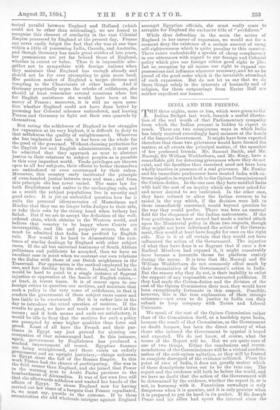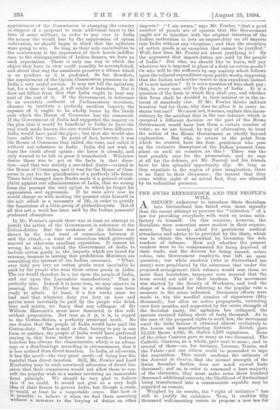INDIA AND HER FRIENDS. T HE three nights, more or less,
which were given to the Indian Budget last week, furnish a useful illustra- tion of the real worth of that Parliamentary sympathy from which the Indian peasant is bidden to expect so much. There are two conspicuous ways in which India has lately received exceedingly hard measure at the hands of the Imperial Government. It might have been expected therefore that these two grievances would have formed the matter, at all events the principal matter, of the speeches of her professed friends. Mr. Samuel Smith, and Mr. Naoroji, Sir William Wedderburn, and Mr. Keay, have a remarkable gift for detecting grievances where they do not exist, and the faculties thus exercised need not have been wholly inactive in presence of a real grievance. Mr. Fowler and his immediate predecessor have treated India, with ex- treme injustice in regard both to the Opium Commission and the Cotton-duties. In the one case they have saddled India with half the cost of an inquiry which she never asked Lir and never desired to see instituted. In the other case, they have refused to allow the Indian revenue to be raised in the way which, if the decision were left to those immediately concerned, would beyond question be the way they would prefer. There was here an unusual field for the eloquence of the Indian malcontents. If the four gentlemen we have named had made a united attack upon the Ministerial policy in these two respects, though they might not have influenced the action of the Govern- ment, they would at least have fought for once on the right side. Nor is it at all certain that they would not have influenced the action of the Government. The injustice of what they have done is so flagrant that if once a few Radical Members had exposed it, it might conceivably have become a favourite theme for platform oratory during the recess. It is true that Mr. Naoroji and Sir William Wedderburn do not commonly effect much by their denunciation of the Government's action in India. But the reason why they do not, is their inability to enlist the support of any responsible or instructed politician. If they had made the Cotton-duties and the division of the cost of the Opium Commission their text, they would have been exceptionally fortunate in this respect. Possibly, however, this is the true explanation o their strange reticence :—not even to do justice to India, can they submit to keep company with Tories and Liberal Unionists.
We speak of the cost of the Opium Commission rather than of the Commission itself, as a hardship upon India, because the result of that Commission, as the Government no doubt foresaw, has been the direct contrary of what those who induced the Government to appoint it hoped and expected. We do not know, of course, what the terms of the Report will be. But we are quite sure of one of two things. Either the conclusions and recom- mendations of the Commissioners will be a virtual condem- nation of the anti-opium agitation, or they will be framed in complete disregard of the evidence collected. From the point of view of India, it does not greatly matter which of these descriptions turns out to be the true one. The report and the evidence will both be before the world, and we have no doubt that the action of the Government will be determined by the evidence, whether the report is, or is not, in harmony with it. Fanaticism nowadays is only dangerous when it is genuine, and it is only genuine when it is prepared to put its hand in its pocket. If Sir Joseph Pease and his allies had spent the interval since the appointment of the Commission in stumping the country in support of a proposal to raise additional taxes to the tune of some millions, in order to pay over to India the money she would lose by the suppression of opium cultivation, we should begin to think that the agitators were going to win. So long as their only contribution to the controversy is the expression of their heroic indiffer- ence to the disorganisation of Indian finance, we have no such expectation. There is only one way in which the object they have in view could possibly be accomplished, and about that way the assailants preserve a silence which is as prudent as it is profound. So far, therefore, the appointment of the Opium Commission promises to do India a very useful service. It may not kill the agitation, but, for a time at least, it will render it harmless. But it does not follow from this that India ought to bear any part of the cost of it. If the Government, in deference to an eccentric outburst of Parliamentary unreason, chooses to institute a perfectly needless inquiry, the expense of it ought to be wholly borne by the funds over which the House of Commons has the command. If the Government of India had suggested the inquiry on the plea that it would be beneficial to India to have the real truth made known, the case would have been different. India would have paid the piper ; but then she would also have called the tune. In point of fact, however, it was the House of Commons that called the tune, and called it without any reference to India. India did not wish to learn the truth about opium ; she knew it already, and only wanted to be left to grow it unmolested. Whatever desire there was to get at the facts in that direc- tion—and that was strictly a one-sided desire—existed in the House of Commons, and it was for the House of Com- mons to pay for the gratification of a perfectly idle fancy. Times have changed since Burke made it a ground of com- Plaint .a,gainst our administration of India, that we wrung from the peasant the very opium in which he forgot his oppressions and oppressors. If he were alive now he would charge us with making the peasant stint himself in the salt which is a necessary of life, in order to gratify the fanaticism of a little group of philanthropists. But of all this not a word has been said by the Indian peasants' professed champions.
In Mr. Fowler's speech there was at least an attempt to justify the action of the Government in reference to the Cotton-duties. But the weakness of the defence was shown by the total want of connection between it and the attack,—a want of connection which grievously marred an otherwise excellent exposition. It cannot be wrong, he said, to forbid the Government of India to include cotton goods in the imports which are taxed for revenue, because in issuing this prohibition Ministers are consulting the interest of the Indian consumer. " What- ever duty you levy on cotton goods must inevitably be paid by the people who wear those cotton goods in India. The tax would therefore be a tax upon the people of India, and not upon the Lancashire manufacturer." That is perfectly true. Indeed it is more true, we may observe in passing, than Mr. Fowler has in a similar case been ready to admit. At least, if a few weeks since we bad said that whatever duty you levy on beer and spirits must inevitably be paid by the people who drink beer and spirits, we fancy that any colleague of Sir William Harcourt's must have demurred to this self- evident proposition. But true as it is, it is, in regard to the Cotton-duties, a perfectly irrelevant truth. No one denies that the people of India would have paid the Cotton-duty. What is said is that, having to pay in one form or another, the people of India would have preferred paying in this form rather than in another. Indirect taxation has always the characteristic, which is an advan- tage or a disadvantage according to circumstances, that it is less noticed than direct taxation. In India, at all events, it has the merit—the very great merit—of being less dis- tasteful than direct taxation. Still, Mr. Fowler and Lord. Kimberley may be such convinced advocates of direct tax- ation that their consciences would not allow them to con- sult the popular wish in a matter involving an immutable fiscal principle. We should be very glad to believe this if we could. It would not give us a very high idea of their fitness to govern India, but though a craze, it would at least be a respectable craze, But how is it possible to believe it when we find them assenting without a murmur to the levying of duties on other imports ? "I am aware," says Mr. Fowler, " that a good number of people are of opinion that the Government ought not to interfere with the original intention of the Indian authorities to levy an import-duty on all imports into India without any exception ; and that the exception of cotton goods is an exception that cannot be justified." Well, how does Mr. Fowler set about justifying it ? By the argument that import-duties are paid by the people of India ? But who, we should like to know, will pay whatever tax is imposed in place of a duty on cotton goods ? Or who will be the sufferers by any scarcity which follows upon the reduced expenditure upon public works, supposing that the Indian authorities resort to this expedient instead of to new taxation ? It is not a question of who shall pay ; that, in every case, will be the people of India. It is a question of the form in which they shall pay, and whether this form shall be decided in their interest or in the in- terest of somebody else. If Mr. Fowler thinks indirect taxation bad for them, why does he allow it in every in- stance but one ? We must not, it seems, explain this incon- sistency by the accident that in the one instance which is excepted a different decision on the part of the Home Government would have lost them a certain number of votes ; so we are forced, by way of alternative, to treat the action of the Home Government as wholly beyond explanation. But why, to return to the point from which we started, have the four gentlemen who pose as the exclusive champions of the Indian peasant been silent on such an occasion as this ? There was the best possible case for the prosecution, and no case at all for the defence, yet Mr. Naoroji and his friends have let this splendid opportunity slip. So long as they expatiate in the region of pure imagination, there is no limit to their eloquence ; the instant that they come within sight of an actual fact, they are silenced by its unfamiliar presence.

































 Previous page
Previous page